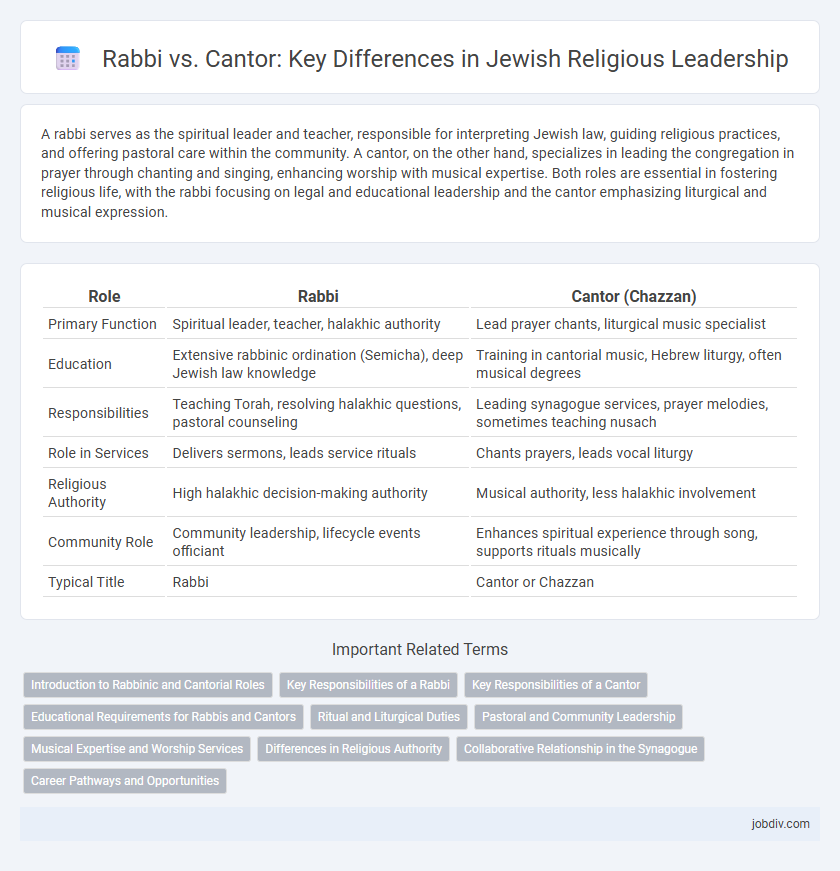A rabbi serves as the spiritual leader and teacher, responsible for interpreting Jewish law, guiding religious practices, and offering pastoral care within the community. A cantor, on the other hand, specializes in leading the congregation in prayer through chanting and singing, enhancing worship with musical expertise. Both roles are essential in fostering religious life, with the rabbi focusing on legal and educational leadership and the cantor emphasizing liturgical and musical expression.
Table of Comparison
| Role | Rabbi | Cantor (Chazzan) |
|---|---|---|
| Primary Function | Spiritual leader, teacher, halakhic authority | Lead prayer chants, liturgical music specialist |
| Education | Extensive rabbinic ordination (Semicha), deep Jewish law knowledge | Training in cantorial music, Hebrew liturgy, often musical degrees |
| Responsibilities | Teaching Torah, resolving halakhic questions, pastoral counseling | Leading synagogue services, prayer melodies, sometimes teaching nusach |
| Role in Services | Delivers sermons, leads service rituals | Chants prayers, leads vocal liturgy |
| Religious Authority | High halakhic decision-making authority | Musical authority, less halakhic involvement |
| Community Role | Community leadership, lifecycle events officiant | Enhances spiritual experience through song, supports rituals musically |
| Typical Title | Rabbi | Cantor or Chazzan |
Introduction to Rabbinic and Cantorial Roles
Rabbinic and cantorial roles serve distinct functions within Jewish religious life, with rabbis primarily responsible for interpreting Jewish law, providing spiritual leadership, and guiding communities through religious teachings. Cantors, also known as hazzans, specialize in leading congregational prayer through liturgical singing and chanting, enriching worship experiences with traditional melodies. Both roles require extensive religious education, with rabbis undergoing rigorous Talmudic study and cantors training in vocal performance and religious music.
Key Responsibilities of a Rabbi
A Rabbi primarily serves as a spiritual leader, offering guidance on Jewish law, ethics, and theology while leading religious services and lifecycle events such as weddings and funerals. They also provide pastoral care, deliver sermons, teach Torah and Talmud classes, and often engage in community leadership and interfaith dialogue. Unlike a Cantor, whose key role is to lead prayer through liturgical music, the Rabbi focuses on religious education, legal interpretation, and counseling within the Jewish community.
Key Responsibilities of a Cantor
A cantor leads the congregation in prayer through melodic chanting and singing, enhancing the spiritual atmosphere of religious services. They are responsible for mastering liturgical music, training the choir, and teaching Hebrew prayers to community members. In contrast to a rabbi, whose primary role involves teaching, interpreting religious laws, and providing pastoral guidance, the cantor specializes in musical worship and the preservation of vocal traditions within the synagogue.
Educational Requirements for Rabbis and Cantors
Rabbis undergo extensive theological education, typically earning a Master of Divinity or equivalent from a seminary, with rigorous training in Jewish law, pastoral counseling, and Talmudic studies. Cantors, also known as hazzans, receive specialized musical and liturgical training, often completing a certification or degree in sacred music that emphasizes Hebrew chant, vocal technique, and prayer leadership. Both roles require deep knowledge of Jewish tradition, but rabbis focus more on legal and spiritual guidance, while cantors concentrate on musical worship and liturgical artistry.
Ritual and Liturgical Duties
Rabbi and cantor both play crucial roles in Jewish worship, but their ritual and liturgical duties differ significantly. The rabbi primarily serves as a spiritual leader and teacher, offering guidance on Jewish law (Halacha), delivering sermons, and presiding over lifecycle events. The cantor, or hazzan, specializes in leading prayer services through melodic chanting and liturgical music, ensuring the accurate and traditional rendition of prayers according to the nusach.
Pastoral and Community Leadership
Rabbi and cantor both play vital roles in pastoral and community leadership within Jewish congregations, with rabbis primarily responsible for spiritual guidance, Torah interpretation, and lifecycle event officiation. Cantors focus on leading prayers, enhancing worship experiences through liturgical music, and fostering communal participation in religious services. Together, they collaborate to support the spiritual well-being and cohesion of their communities.
Musical Expertise and Worship Services
Rabbi and cantor roles differ significantly in musical expertise and worship services, with cantors specializing in leading congregational singing and liturgical music through trained vocal performance and musical arrangement. Rabbis often possess biblical and theological knowledge to guide spiritual teaching and sermon delivery, but they may not have formal musical training or direct responsibility for musical aspects of worship. Cantors enhance religious ceremonies by interpreting sacred texts musically, creating an immersive worship experience that complements the rabbinic leadership's spiritual guidance.
Differences in Religious Authority
Rabbis hold primary religious authority as ordained teachers and interpreters of Jewish law, responsible for leading synagogue services, issuing halakhic rulings, and guiding the community in spiritual and legal matters. Cantors, while highly skilled in liturgical music and prayer leadership, do not possess the same halakhic authority and primarily focus on chanting prayers and enhancing worship through song. The distinction in authority emphasizes the rabbi's role in legal decision-making and teaching, contrasting with the cantor's musical and ritual responsibilities within Jewish religious practice.
Collaborative Relationship in the Synagogue
Rabbis and cantors work collaboratively in synagogues to guide both spiritual leadership and musical worship, enhancing the congregation's religious experience. The rabbi focuses on teaching, pastoral care, and legal interpretation, while the cantor specializes in liturgical chanting and musical instruction, creating a balanced worship environment. Their partnership fosters a cohesive community by blending theological insights with expressive prayer.
Career Pathways and Opportunities
Rabbi career pathways emphasize extensive religious education, including rabbinical school and ordination, leading to roles such as spiritual leader, educator, or community organizer within synagogues and Jewish institutions. Cantors, known as chazzans, pursue specialized training in liturgical music and vocal performance, opening opportunities to lead musical worship services, teach cantorial arts, and perform at religious ceremonies. Both careers offer unique prospects in community leadership, pastoral care, and cultural preservation, with rabbis focusing on theological guidance and cantors on enhancing spiritual experience through music.
Rabbi vs Cantor Infographic

 jobdiv.com
jobdiv.com